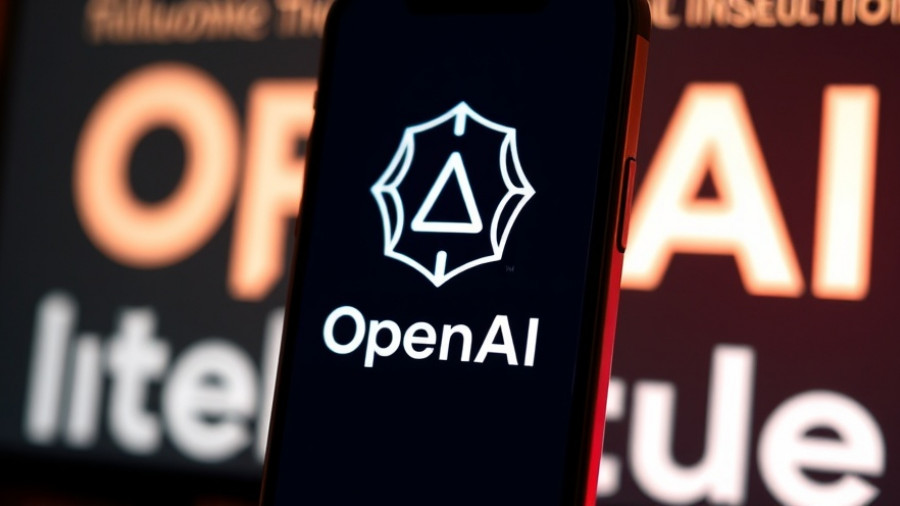
The Rise of OpenAI’s Atlas: A Bold New Competitor in the Browser Wars
In an era where artificial intelligence is reshaping how we interact with technology, OpenAI has unveiled a game-changing web browser named Atlas, designed to compete directly with Google Chrome. Announced on October 21, 2025, Atlas seeks to leverage the capabilities of ChatGPT, already popular with over 800 million users. As OpenAI endeavors to redefine the web browsing experience, this move comes at a time when reliance on AI for navigating the internet is surging.
Atlas vs. The Giant: Understanding the Competition
With Google Chrome currently dominating the market with roughly 3 billion users, Atlas faces a herculean challenge. However, what distinguishes Atlas is its AI integration that provides more than just basic browsing capabilities. The browser replaces the traditional search bar with a chat interface, allowing users to interact with their browsing experience in a conversational manner. According to OpenAI CEO Sam Altman, this approach represents a “once-in-a-decade opportunity to innovate” within the browser landscape.
A Look Inside Atlas: Innovations That Set It Apart
Atlas includes several transformative features that signify a departure from standard browsers. For starters, it incorporates a memory function that remembers users’ browsing habits, offering personalized suggestions based on their activity. This is not merely about history; it’s about enhancing user interaction by providing contextual recommendations as one navigates the web.
Furthermore, the introduction of an 'agent mode' is particularly noteworthy, where Atlas can perform tasks on behalf of the user, such as scheduling appointments or automating online shopping. This effectively positions the browser as a hands-on assistant, demonstrating the potential of AI in making everyday online chores more efficient.
Addressing User Needs: Practical Insights and Tips
For local businesses in Kansas City, the advent of Atlas can be significant. As the browser handles more tasks, it creates opportunities for businesses to engage with customers in innovative ways. Companies should consider how to optimize their web presence for this new browsing paradigm. Ensuring that websites are compatible with Atlas's features, such as chat-based interactions, could enhance customer experiences and drive traffic.
For users interested in exploring Atlas, the initial process involves downloading it from OpenAI’s site, where existing bookmarks and passwords can be imported from other browsers. Learning to leverage Atlas's memory and agent features can further enhance productivity and efficiency in daily tasks.
Historical Context and Future Predictions for Browsers
The launch of Atlas invites comparisons to past browser shifts, where new entrants like Google Chrome disrupted the market long dominated by Microsoft’s Internet Explorer. Historically, each technological leap has redefined user expectations and behaviors. In this context, the unique selling propositions of Atlas—AI interactions and task automation—could signify a significant shift in how browsers are utilized, positioning ChatGPT as a potential new operating standard for internet access.
Facing Challenges: What Lies Ahead for OpenAI?
Despite its innovation, Atlas is entering a highly competitive landscape. Google’s established infrastructure and AI advancements, particularly through its own Gemini technology integrated into Chrome, pose substantial challenges. OpenAI's partnerships, including a significant investment from Nvidia, will be crucial for Atlas's sustainability and market penetration.
Additionally, OpenAI's ambition extends beyond merely capturing market share; it aims to frame ChatGPT as the default operating system for AI in this new era. As attention shifts from browsers to interactive AI systems, understanding public sentiment and shaping user experiences will be key.
The Local Perspective: Why This Matters to Kansas City
For Kansas City residents and local businesses, the launch of Atlas represents not just a technological innovation but a substantial opportunity for economic growth. As AI continues to permeate various sectors, local companies must adapt to stay relevant in a changing landscape. Harnessing tools like Atlas could enhance customer engagement, streamline operations, and innovate services that cater to the evolving needs of consumers.
The integration of AI within browsing technology not only signifies a shift in how users interact with the web but also provides a platform for local businesses to leverage their digital footprints more effectively. Engaging with these tools could be transformative in attracting and retaining customers in Kansas City.
Have a story to share or want to contact us for more details? Drop us an email at team@kansascitythrive.com.
 Add Row
Add Row  Add
Add 




Write A Comment